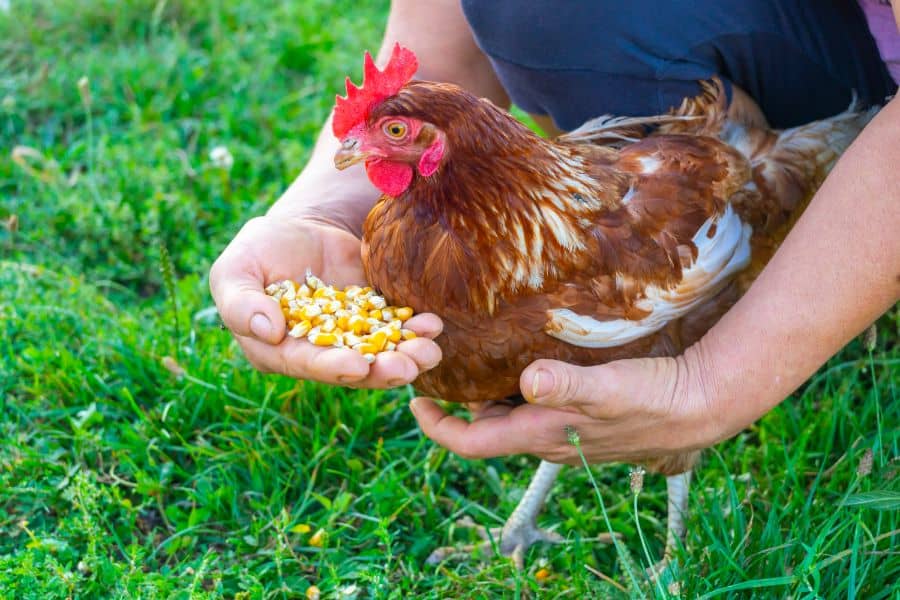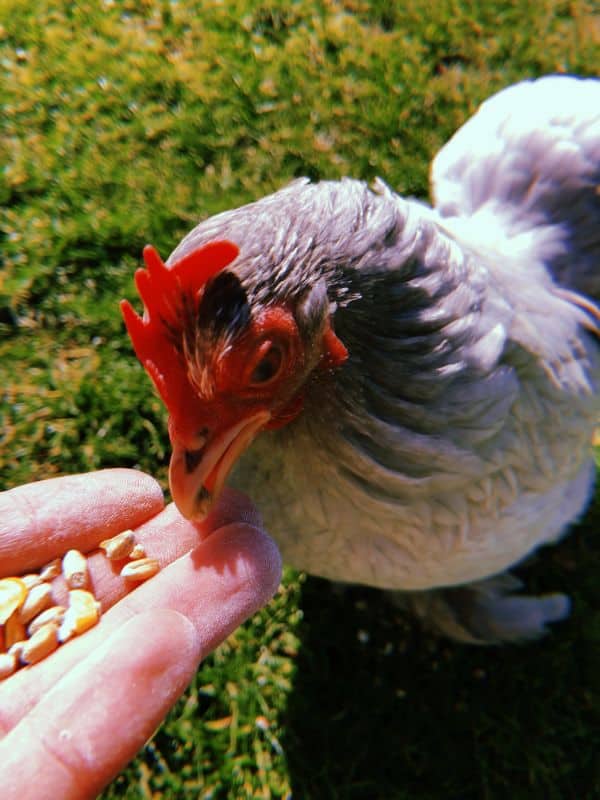Corn, or in Latin, Zea mays, also known as maize around the globe, is an icon of American culture that was already known to the Mayans, Aztecs, and Incas.
It is thought to have originated in Mexico or Central America, and evidence of corn cooking dates back more than 9,000 years. The Indians used it in the “101” way.
As one of the world’s most widely cultivated cereal grains, it has long been an important food and animal feed source.
Many types of chicken feed are made from corn, which should tell you a lot about whether chickens can eat corn.
However, you can find corn in all kinds of forms: corn on the cob, cooked corn, raw corn, cornbread, cornflakes… the list goes on. Are all of these forms good for the chickens? Can and should they eat them? Let’s see!
What Is in a Corn?
Before pointing out the benefits corn has on chickens’ health, let’s look at what is in corn.
100 g of corn contains:
- Calories: 96
- Water: 73%
- Carbs: 21 grams
- Protein: 3.4 grams
- Sugar: 4.5 grams
- Fiber: 2.4 grams
- Fat: 1.5 grams
Compared to other types of vegetables and fruits we discussed in the past, corn is packed with macros.
It’s a great source of energy, especially in the winter when chickens need more energy to keep themselves warm due to high caloric amounts and protein, which is essential for many processes such as egg production, immunity, and growth.
Fiber, which is crucial for a healthy digestive system, is also on the high side.
Vitamin E
Vitamin E is one of the most important vitamins for the health of chickens. Unfortunately, not all chickens are lucky to get proper amounts of it which is why vitamin E deficiency isn’t that rare of an occurrence. It’s crucial in egg production, helps against heat stress, and increases the hatch rate.
Phosphorus
A chicken egg, on average, contains 100 mg of phosphorus, so it must be a part of the chicken’s diet.
Corn is a great source of this mineral which, besides aiding proper egg production, plays a key role in bone growth, skeleton strength, body tissue maintenance, and metabolizing calcium (another mineral important for proper egg production and bone health).
A less-known fact about phosphorus is that it’s expensive in chickens’ diet – all the more reason to feed corn to your birds.
Vitamin b1
Vitamin b1 or thiamine has many functions in a chicken’s body, such as strengthening the immune system, helping the body deal with stress, and metabolizing carbohydrates.
Copper
Copper supplementation is linked with optimizing the intestinal structure and enhancing the balance and function of chickens’ microbiomes.
Is Corn Good for Chickens?
Of course, it is! It is a staple ingredient in chicken feed and plays a crucial role in ensuring the health and well-being of our feathered friends!
Corn Provides Energy for Chickens
At 96 calories per 100 g serving, corn provides lots of energy. Especially considering the fact it’s quite cheap and a treat after all. Chickens need energy year-round to function properly, especially in the winter when their energy needs increase.
During the cold months, keeping a proper body weight and a warm body is more costly. To help your chickens with these tasks, you can give them the occasional corn treat! If it’s corn on the cob, even better!
Corn Is a Great Source of Fun for Chickens
In today’s world of internet reality, cats and dogs are seen as queens and kings and only animals worthy of entertainment. But that shouldn’t be the case. If you have ever raised chickens, you know how crazy they can go with their pecks – they do like to nibble on stuff.
So why not give them something that’s nutritionally valuable and fun to snack on, like corn on the cob?
Research has shown that chickens that are provided with things or activities that keep them engaged, such as obstacles, toys, and entertaining snacks, will experience improvements in overall well-being and psychical health.
Also Read: Can Chickens Eat Rice?
Can Chickens Eat Corn on The Cob?
We have recommended giving corn on the cob to your chickens a couple of times in the previous section.
Not only does it take no time to prepare and serve it, but it also provides your chickens with direct access to the full nutritional value of raw corn.
Pecking the corn on the cob keeps them engaged and consequently improves their physical health.
Although your chickens may enjoy munching on corn on the cob every day, you should give it to them only occasionally or mixed with their regular feed that provides all necessary nutrients.
Can Chickens Eat Corn Husks and Silk?
Corn husk is the outer green layer of the corn, while silk is the fiber located at the top of the cob corn. Humans don’t really enjoy eating these parts of corn, so many people don’t know if they’re appropriate for chickens to consume.
They are! Corn is a safe option for chickens to eat in general, and none of its parts is unhealthy for the chickens.
However, you should know that corn husks and silk aren’t that nutritionally valuable, which means you should look at them as something that will keep the flock occupied and engaged instead of something that will feed it.
Since you aren’t going to eat it anyway, it’s definitely better to provide some additional fun for your birds than to throw it away.
Can Chickens Eat Canned Corn?
Compared to raw variety, canned corn has more calories and fat and less protein, fiber, and sugar. Some of these things can be considered beneficial (less sugar), while others are not so (more fat and less protein).
But that isn’t the main issue with canned corn. Like other types of canned food, canned corn contains many additives that are added to preserve the food and make it consumable for longer periods.
One of those additives is sodium, and a serving of 100 grams of canned corn contains 226 milligrams of it. Chickens and many other animals need sodium (salt) to maintain body fluids balance and properly run muscles and nerves.
However, chickens need it in small doses, typically added to their feed. Since High amounts of sodium are linked to health issues such as kidney and cardiovascular diseases and chickens have a low tolerance for salt, we wouldn’t recommend you go crazy with feeding canned corn to your flock.
You can definitely give it as a treat but hand it out less than you would other treats like raw or cooked corn.
Can Chickens Eat Corn Meal?
You get cornmeal when you grind dried corn kernels into a fine powder. It is actually used as an ingredient for many chicken feeds and often as a supplement to chickens’ regular diet.
You can mix it with other feed ingredients, such as soybean meal or wheat bran, to create a well-balanced diet for your chickens.
So, stop wondering whether you should or shouldn’t feed it to your feathered friends!
By adding the cornmeal, you will provide them with proteins and carbohydrates and not only maintain their energy levels but also keep their feathers healthy.
However, offering only a small amount of cornmeal, not more than 10 %, as part of a balanced diet is very important.
Can Chickens Eat Cornbread?
Sure! You can safely feed your chickens cornbread leftovers! Moreover, they will probably love its soft crumbly texture and sweet flavor!
It is a widely available and affordable item that, compared to other types of food, doesn’t contain a lot of calories or fat.
It is a great source of fiber and provides a variety of vitamins and minerals, including protein, carbohydrates, and other nutrients necessary for the healthy growth of your flock.
However, ensure that the cornbread you feed your chickens is fresh and not moldy.
To make it easier to digest, you can soak smaller pieces of cornbread with water and apple cider vinegar.
And if you are concerned about your chickens’ health, always check the ingredients label to make sure no toxic substances or sugars are added.
Also, consider that cornbread should be only a treat and a supplement to quality commercial feed that meets your chicken dietary requirements.
Can Chickens Eat Cornflakes?
The answer to this question depends on the question of what kind of cornflakes we are talking about.
If the cornflakes in question are high in sugars, salts, and additives or have artificial colors and flavors, then you shouldn’t feed them to your chickens.
Doing otherwise (and doing so on a regular basis) may lead to weight gain, electrolyte imbalance, difficulties processing foods, and other health issues. Unfortainaly a lot of commercially available cornflakes fall into the category of don’t-feed-it-to-your-chickens.
One thing that needs to be noted here is that you will see a lot of online sources aiding on the side of giving cornflakes to the chickens occasionally despite the possible health problems that come with consuming them.
The thinking is that cornflakes are a great source of energy, fiber, and protein, and since they’re being fed only occasionally as a treat, you can turn a blind eye to the bad things that are inside of them. But why risk when there are tons of healthy and natural treats like fruits and veggies?
Can Chickens Eat Cracked Corn?
We said there are many forms of corn, didn’t we?
We’re going to discuss cracked corn which refers to dried corn kernels that have been broken or crushed into smaller bits. Typically, cracked corn is derived from maize, a type of corn cultivated mainly for industrial purposes and livestock feed.
Some people consider feeding chickens cracked corn as their main source of nutrition, which will tell you everything you need to know regarding whether chickens can eat cracked corn. It is not just a portion of food but also facilitates your chickens’ healthy digestion.
While it’s up to 10% more digestible due to its smaller size, cracked corn isn’t that good or nutritionally valuable, meaning it should only be mixed into chicken feed or grit and treated as a snack and given to the hens occasionally.
When to Start Feeding Chickens Cracked Corn?
Experts point out that feeding baby chickens with standard food for adults is possible, but such products must be thoroughly ground beforehand. Only after 6 weeks of age can chicks be safely fed cracked corn and whole grains without grinding.
Can Chickens Eat Raw Corn?
It’s no secret that animals prefer cooked over raw food. Cooked food is easily digestible, which leaves animals with more energy and time to do other stuff.
However, their digestive system is very much capable of dealing with raw stuff, so you won’t see an animal complaining about not getting that sweet hot meal.
Even though it’s harder to peck on than the cooked version, raw corn doesn’t pose any threats to hens’ health. On the contrary, it’s even healthier since it comes with full nutritional value.
Read More:
Conclusion
Finally, we can confidently state that corn’s advantages in chicken feed are numerous and considerable.
Regardless of how it is fed, it is an important and beneficial chicken feed ingredient, and It’s not only cheap and easy to find, but it’s also highly nutritious and promotes your chickens’ overall health and well-being.
Its versatility makes it an excellent choice for promoting chicken flock growth and development.
However, corn-based feed alone may not supply all the nutrients required for your chickens’ optimal health, but it may be an excellent addition to chickens’ feed if properly balanced with other ingredients.


